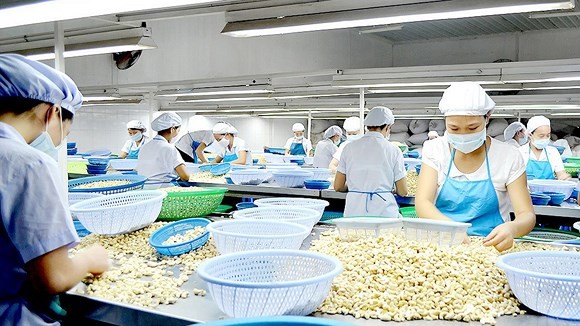
Binh Phuoc Province is called capital city of cashew of Vietnam. The province’s cashew products have been exported to 25 countries and territories and become popular thanks to high quality. There are around 134,000 hectares of cashew trees in the province, accounting for nearly 50 percent of cashew area in the country. Total yield nearly reached 150,000 tons, accounting for 50 percent of the country’s total cashew yield. There are roughly 200 businesses and 400 households participating in cashew processing field, of which around 31 businesses export directly with total capacity of about 81,000 tons, worth more than US$807 million.
However, production in the past years has just met 25 percent of processing capacity and the province has had to import raw cashew from Africa; therefore, input material depends heavily on imported material source. Currently, 80 percent of small and medium businesses in the province have had to close down.
Mr Vu Manh Tung who has worked in the cashew processing industry for nine years said that around 90 percent of cashew businesses in the province were facing losses with some losing up to VND15-20 billion.
According to cashew processing and exporting firms, global market has a great impact on domestic cashew processing industry. The governments of other countries interfered deeply in raising exporting prices of raw cashew in order to protect their farmers.
In the past two years, the price of nuts dropped drastically. In 2017 and 2018, cashew nut price has declined by 40 percent. Cashew processing firms are always in passive position because they are unable to take initiative in material source as well as consumption.
Figures by the Department of Agriculture and Rural Development of Binh Phuoc Province showed that processing capacity of local cashew firms was still limited. There are only 31 firms with true capacity to import raw cashew for processing in the whole province. Meanwhile, the rest has to import raw cashew because they do not have any cashew after harvest season.
According to a firm owner, it is high time that businesses and authorities selected well-established firms to let them thrive, especially when consumers tend to appreciate quality and goods safety. Although more raw cashew was imported in the last three months for the rising demand during Tet holidays, it was unable to ease material shortage. Therefore, it is necessary to build specialized farming area, provide financial support for reproduction, focus on market forecast, strengthen the voice of cashew association and form connections to help cashew industry with consumption.
After receiving geographical indication certificate for raw cashew, cashew nuts, roasted and salted cashew nuts granted by the National Office of Intellectual Property, Binh Phuoc Province has granted geographical indication for four firms, consisting of Son Thanh Production Trading Import and Export Joint Stock Company with raw cashew, cashew nuts and salted cashew nuts; Ha My Joint Stock Company; My Le Company; and Hoang Phu Company with cashew nuts and salted cashew nuts.
Mr Vu Duy Khien, director of Center for Industrial Promotion and Industrial Development Consulting of Binh Phuoc Province, said that the province has supported 63 cashew businesses with total cost of more than VND11 billion for building of six cashew processing technique demonstration models for display; application of five color sorting machines, 16 cashew nut peeling machines, five boiler systems for raw cashew processing and 30 cashew shell separator machines in cashew processing line.
Binh Phuoc has been chosen to carry out a national industrial promotion project, of which the province will receive support in machineries and equipment to improve domestic cashew nut yield, new technology and training governance capacity to help cashew businesses to maintain their product quality.
According to Mrs Do Thi Minh Tam, deputy head of the Office of Industry and Trade of Binh Phuoc Province, in order to maintain steady growth, cashew industry still has many issues to consider and deal with. The province should continue to improve governance capacity, labor’s quality and skill; diversify products made from cashew and cashew nuts; and apply green and energy saving production to reduce cost.
























